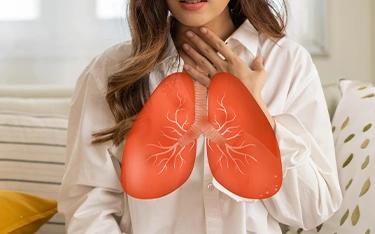Over 4.5 million people in India suffer from lower respiratory infections each year, often triggered by pollution, weak immunity, or seasonal changes. These infections may begin with a mild cough but can quickly escalate to chest tightness, wheezing, or breathlessness.
Recognising the symptoms early is key to preventing serious complications. At Dr Batra’s®, we offer personalised homeopathic treatment that helps relieve symptoms, boost lung function, and prevent recurrence, without side effects.This blog explores the causes, signs, and natural ways to manage lung infections, with a focus on safe, holistic support through homeopathy.
Lung Infections: Key Facts You Shouldn’t Ignore
What Triggers It / Causes
- Viral or bacterial infections
- Weak immunity
- Exposure to pollution or toxic air
- Seasonal allergies
- Underlying conditions like asthma or bronchitis
Role of Immunity
Low immune response increases vulnerability to lung infections. Older adults, children, and those with chronic illnesses are at higher risk.
Lifestyle and Environmental Factors
- Smoking and secondhand smoke exposure
- Occupational dust and chemicals
- Poor air quality in urban areas
Insights into global study
A clinical case by Dr Batra’s®, published in Homeopathy 360, showed how the remedy Bryonia effectively treated pneumonia with pleural effusion, avoiding surgery, by addressing both physical and emotional symptoms through personalised homeopathy.
Symptoms of Lung Infection
Lung infections can start with mild discomfort but may quickly escalate. Recognising these symptoms early can prevent complications:
- Persistent cough (dry or with mucus)
- Shortness of breath or wheezing
- Chest pain or tightness while breathing or coughing
- Fever or chills
- Fatigue and general body weakness
- Loss of appetite or irritability in children
- Bluish lips or fingertips (in severe cases)
If any of these symptoms last beyond a few days, worsen, or affect your daily activity, consult a doctor immediately. Early detection ensures faster recovery and prevents chronic lung damage.
Dr Batra’s® pro tip:
Persistent coughing or shortness of breath is not normal. If you notice these symptoms of a lung infection, get it checked early. Homeopathy helps strengthen lung function and prevent frequent infections naturally.
Tips to Manage or Prevent Lung Infections
How to Manage Lung Infections
- Stay hydrated and get plenty of rest
- Avoid exposure to smoke, dust, or polluted air
- Use a humidifier if the air is dry
- Practice steam inhalation
- Avoid cold, sugary, or processed foods




